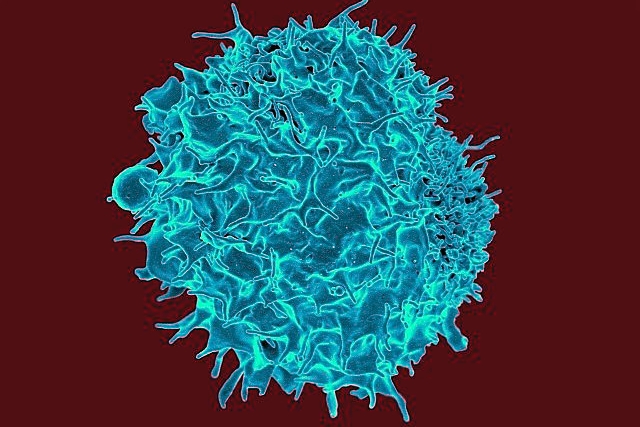22 June 2023. Results of a small clinical trial show genetically altered T-cells from patients with myasthenia gravis are well tolerated and reduce symptoms of the disease. A report of the trial, testing a treatment developed by Cartesian Therapeutics Inc. in Gaithersburg, Maryland, appears today in the journal The Lancet Neurology (paid subscription required).
Cartesian Therapeutics is a biotechnology company creating cell therapies for autoimmune disorders and cancer. The seven year-old enterprise modifies T-cells from the immune system using a patient’s own cells, called autologous cells. Treatments from autologous T-cells reduce the risk of immune rejection, and the company says its process enables use of these cells without an initial toxic chemotherapy stage to remove existing T-cells called lymphodepletion. Cartesian also engineers mesenchymal stem cells from bone marrow for off-the-shelf therapies.
Cartesian Therapeutics’ lead product is an engineered T-cell therapy code-named Descartes-08 as a therapy for myasthenia gravis, an autoimmune neuromuscular disorder. Myasthenia gravis or MG results from antibodies in the immune system that block nerve impulses from the brain traveling to muscles in the body. The condition affects muscle functions, with symptoms such as extreme fatigue and weakness, as well as disrupted breathing, smiling, vision, swallowing, and mobility. Myasthenia Gravis Foundation of America says more than 70,000 people in the U.S. are diagnosed with the disease.
“Conventional, DNA-engineered CAR T-cells are highly effective in treating several blood cancers,” says Cartesian Therapeutics chief medical officer Milos Miljkovic in a company statement, “but associated toxicities and the need for lymphodepletion chemotherapy limit their use beyond oncology. To expand the capabilities of cell therapy to new areas and improve safety, we engineered CAR T-cells with RNA and used them to treat patients with MG.”
Determine safe dose and changes in symptom severity
In Descartes-08, Cartesian alters a patient’s T-cells with RNA, the nucleic acid that carries instructions from DNA genetic codes to cells for producing proteins, in this case to express proteins called chimeric antigen receptors. The company says Descartes-08 treatments are returned to patients in six weekly infusions in an outpatient setting. Cartesian says the first use of Descartes-08 is myasthenia gravis, but the company plans to test the therapy with other autoimmune disorders.
The mid-stage clinical trial has two parts, first to determine the safety of Descartes-08 among myasthenia gravis patients and track initial clinical effects from the treatments, and later to assess Descartes-08 in patients with the disease against a placebo. The trial, sponsored by Cartesian Therapeutics, is enrolling a total of 30 participants with myasthenia gravis at 14 sites in the U.S. and one site in Canada.
In the first part of the trial, the study team is looking adverse effects of the treatments to help determine a safe dose for patients, but also changes in scores on standard scales assessing severity of myasthenia gravis symptoms, with participants tracked for up to a year. Findings from this part of the study, published today, report on results from 14 of the initial 16 participants — two individuals did not meet the trial’s inclusion criteria — at three to nine months following treatment.
The authors report among the 14 participants, of which 10 are women, none experienced toxicity that could limit doses of Descartes-08, nor toxicity to nerve cells or cytokine release syndrome indicating immune system overreaction. Common adverse effects, resolved within 24 hours, include headache, nausea, vomiting, and fever. In addition, participants on average show improved scores on three standard scales of myasthenia gravis symptoms and quality of life. Findings from the trial testing Descartes-08 against a placebo are not in today’s report.
More from Science & Enterprise:
- Clinical Trial Begins for Peanut Allergy Treatment
- Collaboration to Boost Rare Disease Clinical Trials
- T-Cell Biotech Gains €17.5M in Grant, Equity Funds
- State Grant Supports Osteoarthritis Gene Therapy Trial
- Data Support Placebo Group Alternatives in Rare Disease Trials
We designed Science & Enterprise for busy readers including investors, researchers, entrepreneurs, and students. Except for a narrow cookies and privacy strip for first-time visitors, we have no pop-ups blocking the entire page, nor distracting animated GIF graphics. If you want to subscribe for daily email alerts, you can do that here, or find the link in the upper left-hand corner of the desktop page. The site is free, with no paywall. But, of course, donations are gratefully accepted.
* * *


 RSS - Posts
RSS - Posts
You must be logged in to post a comment.